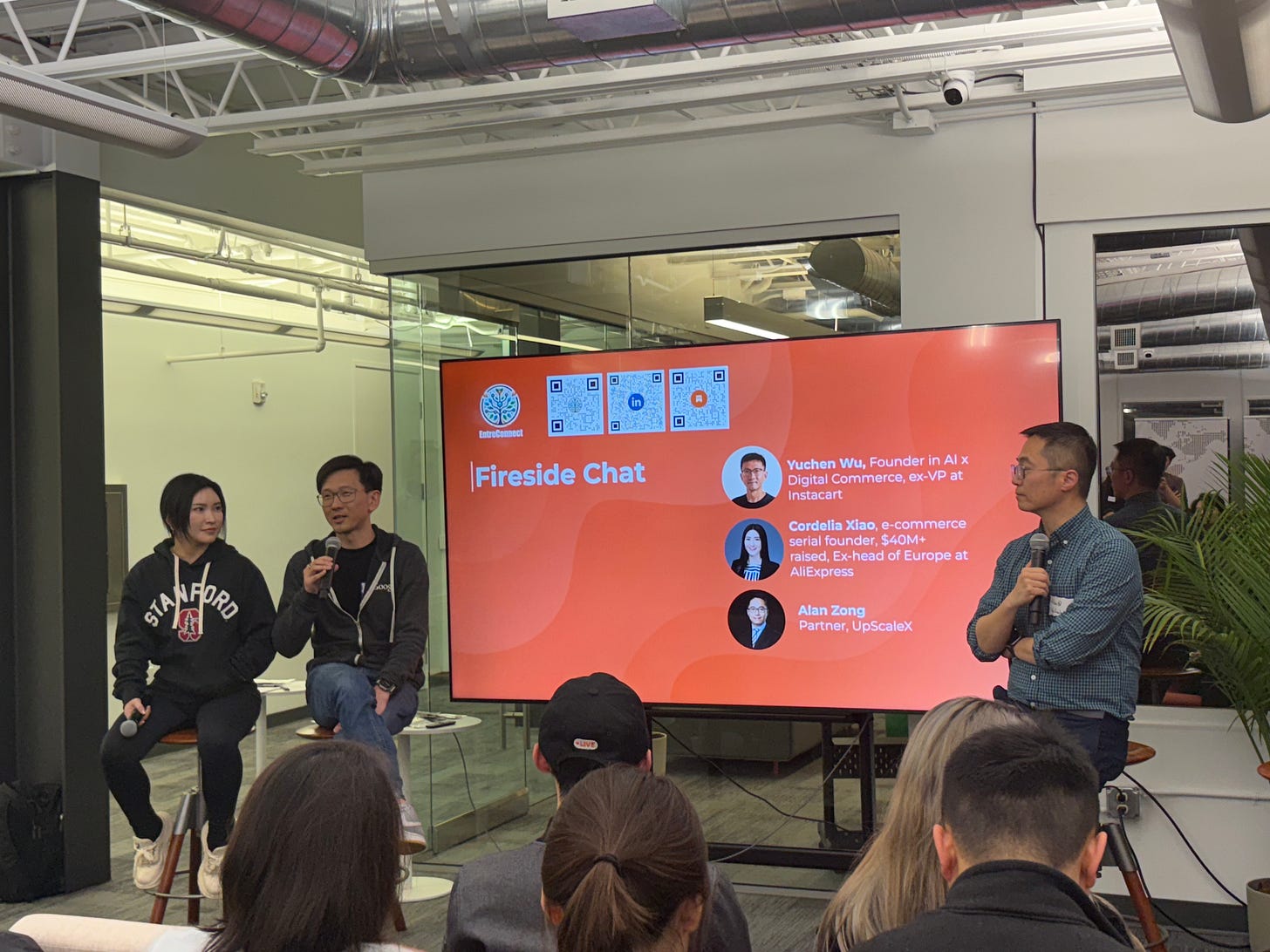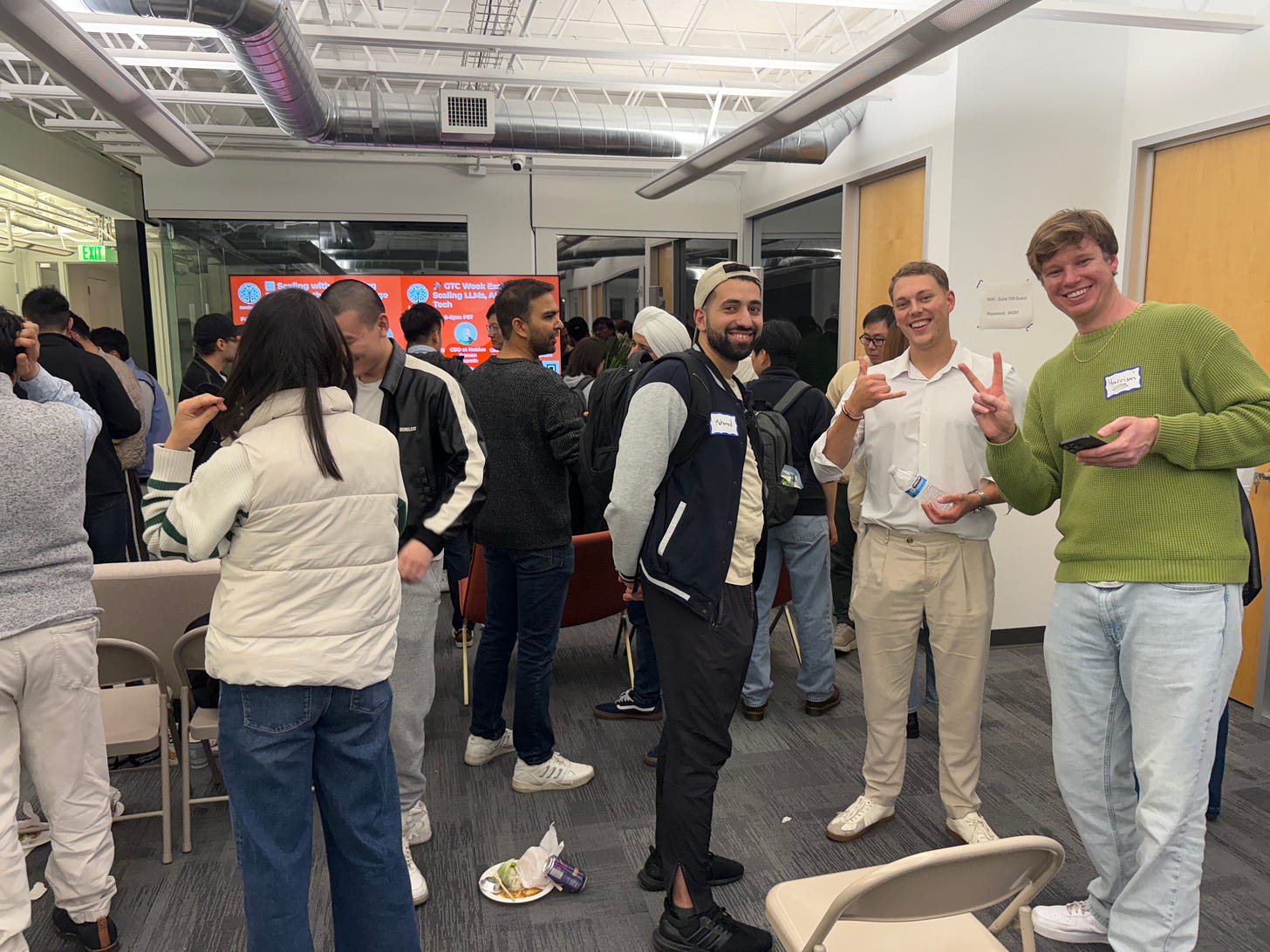🎉 Event Recap: From Founder Spotlights to Cracking the B2C Code with Palmstreet, Instacart & AliExpress Leaders
Last week, we hosted two powerhouse events, bringing together founders, builders, and investors for deep, unfiltered discussions on scaling companies, cracking B2C growth, and the future of commerce.
🌟 Founder Spotlight | Startup Showcase & Investor Hangout
A night showcasing 10+ breakout startups across B2B SaaS, Fintech, Gaming, AI, MedTech, HR Tech, and Marketplaces—followed by an investor panel featuring insights from Amino Capital, UpScaleX, DCM Ventures, and Fusion Fund on emerging trends and investment opportunities.
🎤 Featured Startups & Founders
🎯 Mused (Luke Hollis) – AI agents for mission-critical simulations (mused.com)
📊 AmolinoAI (Aseem Asthana) – AI-driven sales pipeline analysis (amolino.ai)
🏥 RegHero (Xiao He) – Automating MedTech regulatory affairs with AI (reghero.org)
🎮 Sizzle (Vijay Koduri) – AI-powered gaming highlights & insights (sizzle.gg)
🎥 GLX Studio (Zak Zielezinski) – The "easy button" for business video creation (glxstudio.com)
☁️ CloudRift (Dmitry Trifonov) – AI infrastructure & developer tools for AI computing (cloudrift.ai)
🔍 TruSources.ai (Sanjay Krishnamurthy) – AI-powered KYC/ID verification (trusources.ai)
👨💻 Eskalate (Brian Bell) – Vetted offshore developers for staffing & outsourcing (eskalate.io)
🏆 Gamlytics (Casino Apte) – Esports management platform powered by AI (gamlytics.gg)
🎶 Nebula (Yamen Hawit) – Fractional music royalty marketplace (nebu.la)
🛡️ Yottasecure (Sunil Ravipati) – Real-time AI-powered cyber defense (yottasecure.com)
🎓 StudyCrowd.AI (Nini Sarishvili) – AI tutor/mentor helping students excel (studycrowd.ai)
💡 How You Can Help:
We’ve compiled a spreadsheet with each startup’s key details and their "asks." If you can connect them with investors, customers, or talent, it could be game-changing for these founders!
🔧 Cracking the B2C Code: What It Really Takes to Win in Consumer Tech & Commerce
A packed house of 120+ founders and builders joined for an in-depth discussion on scaling B2C businesses, featuring:
🎤 Keynote from Chen Li, CEO of Palmstreet (formerly Plant Story, Series A+), on his scrappy, brutal journey—failed pivots, bootstrapping, and live commerce success.
🔥 Fireside chat with stealth startup founders:
Yuchen Wu (ex-VP, Instacart)
Cordelia Xiao (ex-Regional Head, AliExpress, $40M+ serial founder)
They broke down AI’s role in commerce, TikTok’s impact, hiring & talent challenges, and the evolving landscape of cross-border e-commerce.
🌱 The Palmstreet 0 to 1 Journey: A Masterclass in Scrappiness & Iteration
Building a startup is rarely a straight path to success. Chen’s journey with Palmstreet was a 3.5-year grind filled with failures, pivots, and relentless execution. His story highlights the importance of persistence, validating ideas before scaling, and executing aggressively to win customers and investors.
💡 1. Finding the Right Idea: Learning from Failure & Real-World Insights
Chen’s startup journey began with multiple failed attempts before hitting the right idea:
Plant ID App (2020) – AI-powered plant identification, but people used it once and never returned.
Water Reminders – A feature meant to increase engagement, but it didn’t drive retention.
Plant Social Network – A community where users could share plant pictures, but engagement was low.
Photo-Based Marketplace – Allowed people to buy and sell plants, but listings weren’t converting into sales.
After multiple failed pivots, Chen decided to take a step back and observe real-world behavior. He noticed plant sellers on Instagram Live were generating thousands of dollars in sales despite Instagram not being built for shopping. Instead of immediately building another marketplace, he tested the concept himself—selling plants via Instagram Live. When people instantly bought what he showcased, he realized he had found something with real demand.
💡 Lesson: Don’t just build—watch how people behave in the real world and validate demand before committing resources to development.
📋 2. Validation Through Hustle: Testing Before Scaling
Most founders assume that a great product will automatically attract users. Chen knew better—he had to grind for his first sales before even building Palmstreet.
He continued selling plants manually on Instagram Live every night, refining the format and deeply understanding what sellers needed. Only after fully validating demand did he start building a dedicated live shopping marketplace.
But even after launching, getting sellers to trust the platform wasn’t easy. He had to:
Cold-call 50 sellers just to get one to join.
Attend 50+ trade shows, meeting sellers face-to-face and personally pitching them.
Buy inventory upfront from sellers to reduce their risk and get them to test the platform.
Manually onboard sellers, traveling to meet them, and ensuring they had everything needed for success.
💡 Lesson: The best startups don’t start with code. They start with deep customer understanding and manual validation before scaling.
📈 3. Scaling & Staying Ahead of Competition
Once Palmstreet had initial traction, Chen focused on scaling efficiently while staying ahead of competitors. Growth came from three key strategies:
Paid Ads & Marketing: Once sellers were succeeding, they reinvested in targeted ads to bring in more buyers.
Strategic Partnerships: Partnered with plant influencers and niche communities to expand their audience.
Automation: Introduced AI-powered recommendations and inventory management to improve efficiency.
But scaling wasn’t just about growth—it was also about staying ahead of the competition. As other companies started copying the live shopping model, Palmstreet:
Expanded beyond plants into crystals, pottery, and reptile supplies, tapping into different niche communities.
Introduced interactive live shopping features such as real-time auctions, dual-stream selling, and interactive buyer-seller engagement tools.
Focused on retention over just acquisition, ensuring sellers stayed engaged by offering better tools and support.
💡 Lesson: Scaling isn’t just about growth—it’s about staying agile, continuously iterating, and expanding strategically to outpace competitors.
4. Final Thought: The Founder’s Journey is Never Easy
Chen’s success with Palmstreet wasn’t overnight—it was built on relentless persistence, testing before scaling, and executing aggressively to win customers and investors.
Palmstreet’s journey is a masterclass in scrappiness, execution, and winning against the odds—proof that startup success is never about luck, but about relentless iteration and determination.
🎬 Fireside Chat: AI, TikTok & The Future of Commerce
As AI transforms commerce and TikTok reshapes the global e-commerce landscape, brands—both large and small—must adapt. Yuchen Wu and Cordelia Xiao, two stealth startup founders and industry experts, broke down the latest trends in AI-driven personalization, the TikTok commerce boom, and the evolving cross-border supply chain.
🧠 1. AI is Reshaping Commerce: Beyond Ad Optimization
AI is revolutionizing e-commerce by giving small brands access to powerful tools once reserved for tech giants. From content creation to logistics, AI is reshaping every stage of the shopping journey.
How AI is Transforming E-Commerce:
AI-Generated Content – AI now automates product descriptions, ad captions, social media posts, and even full short-form videos, significantly reducing creative costs for brands.
AI-Powered Customer Interactions – Chatbots, voice assistants, and automated responses now handle pre-sale inquiries, process returns, and provide personalized product recommendations, improving customer experience and reducing the need for human support.
Automated A/B Testing and Ad Optimization – AI can test different ad creatives, adjust pricing strategies, and segment customers in real-time, making marketing efforts more efficient and cost-effective.
AI Extends Beyond Marketing—It’s Changing Supply Chains Too:
Predictive Demand Forecasting – AI helps retailers anticipate demand shifts, preventing stockouts and overstocking.
Warehouse Optimization – AI-driven systems ensure that products are stored and dispatched from the most efficient locations, reducing costs and delivery times.
Dynamic Pricing Adjustments – AI adapts pricing in real-time based on demand, competition, and customer behavior, maximizing sales and profitability.
📲 2. The TikTok Commerce Boom & The “One Hero Product” Rule
TikTok is emerging as a major force in e-commerce, with brands leveraging short-form video content to drive sales. However, it still trails behind Douyin (China’s version of TikTok), which has mastered social commerce.
Why Social Shopping Exploded in China First:
Influencer-Driven Commerce – Chinese consumers trust key opinion leaders (KOLs) more than traditional brands, making influencer marketing a dominant force.
Frictionless Payments – Seamless integration with WeChat Pay and Alipay enables instant, one-click checkout, reducing drop-off rates.
Impulse Buying Culture – Chinese consumers are more open to spontaneous purchases, while Western consumers tend to research more before buying.
Challenges for TikTok’s E-Commerce Growth in the U.S.:
Payment Friction – Unlike Douyin, TikTok lacks a seamless, one-click checkout experience.
Consumer Trust Issues – U.S. shoppers are generally more skeptical of lesser-known brands and often prefer established retailers.
Brand Loyalty – American consumers tend to stick with familiar names like Amazon, Costco, and Walmart rather than trying new D2C brands.
The “One Hero Product” Strategy: Why Simplicity Wins on TikTok
Unlike traditional e-commerce platforms like Amazon or Shopify, where consumers browse large catalogs, TikTok commerce is built around simplicity and clarity.
💡 Winning formula for TikTok brands:
Focus on a single, standout product per ad instead of showcasing an entire store.
Keep messaging clear and engaging—if a viewer is confused, they won’t buy.
Leverage viral, attention-grabbing products like beauty tools, kitchen gadgets, and fitness gear. These items thrive because they solve a clear problem or offer a unique benefit in seconds.
🌎 3. Cross-Border E-Commerce & AI’s Role in Supply Chains
With rising tariffs and higher shipping costs, Chinese sellers are adapting their strategies to stay competitive in the global market. Instead of relying solely on direct-to-consumer (B2C) models, many are shifting toward business-to-business (B2B) and localized fulfillment solutions.
The New Cross-Border Playbook:
B2B Expansion – More Chinese brands are focusing on wholesale distribution instead of individual customer sales, allowing them to scale more efficiently.
Localized Warehousing – Many top sellers are setting up fulfillment centers in the U.S. to reduce shipping costs and delivery times, improving customer trust and conversion rates.
Tariff Avoidance Strategies – Some brands are modifying supply chain routes to bypass high import duties and keep prices competitive.
AI’s Growing Role in Global Logistics:
Beyond e-commerce marketing, AI is now a critical driver of supply chain efficiency:
Real-Time Demand Forecasting – AI predicts buying trends and adjusts inventory levels to prevent overstocking or stockouts.
Smart Warehousing & Fulfillment – AI helps brands optimize storage locations and pick-and-pack processes, reducing fulfillment time and costs.
AI-Driven Dynamic Pricing – By analyzing market trends, AI enables brands to adjust pricing in real-time, maximizing profitability without losing competitiveness.
That’s All!
A huge thank you to everyone who attended these events—and for those who couldn’t, we look forward to seeing you at our next event! Let’s continue learning, building, and pushing the boundaries of what’s possible. 🚀
🌟 Video of the Week
Check out this highlight from our recent event, where industry leaders dive into strategies for building a competitive moat in GenAI. 🚀
🗓️ Upcoming Events
Save the date for our events line-up!
Feb 28 | Scaling with AI: Driving Sales Growth, Product Usage, and Customer Retention (Plug and Play): Discussions with CEO, CPO, EVPs, founders, and investors with product and customer growth expertise from Zara, Salesforce, Gofundme, 500 Global, and more.
[NEW] Mar 18 | GTC Exclusive: Scaling LLMs, AI Infrastructure & Deep Tech with C-Suite Leaders from Top Public Companies & Unicorns (Plug and Play): Join C-suite leaders and founders for an exclusive discussion on the future of AI hard tech, featuring executives from Turing, Nebius, Gen, Instacart, Google, HP, and more. ⚡ Limited sponsorship slot remaining: team@entreconnect.us











This recap really highlights how crucial iteration and customer validation are in the early stages of building a startup. Chen's journey with Palmstreet is such a great example of staying scrappy and learning directly from user behavior before scaling.
When it comes to cross-border e-commerce, especially with localized fulfillment centers, how are smaller brands balancing the upfront costs of setting up warehouses versus the long-term benefits of faster shipping and customer trust?